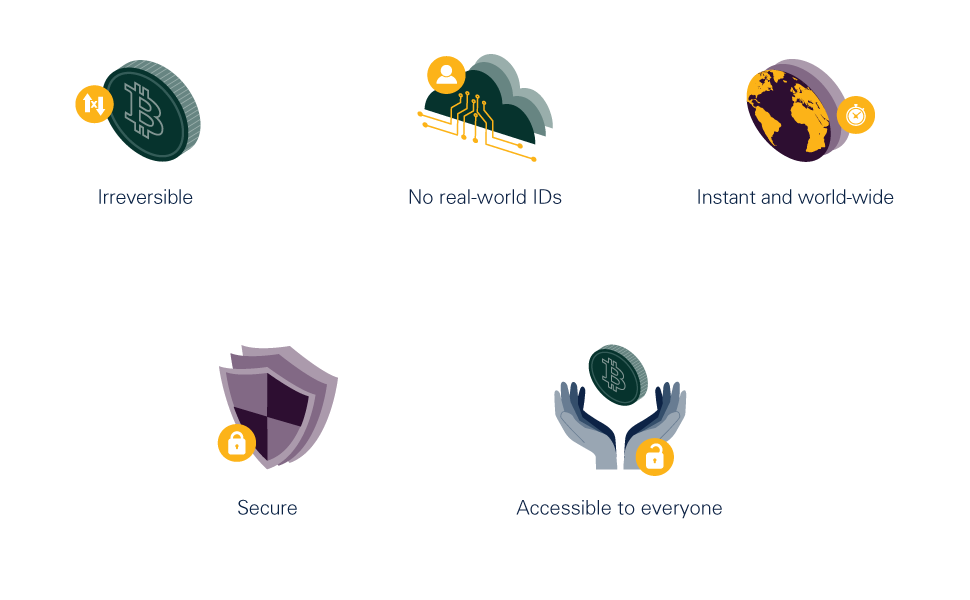Revolutionise Your Business Strategy With An Investment In Blockchain Technology
The blockchain business model

The exploration of the blockchain ecosystem – a system which records and stores transaction records – and blockchain business opportunities was initially reserved for organisations operating in the financial sector. However, the potential of blockchain technology and the impact it will have on a plethora of different business models is now being realised by industries throughout the world. It’s important in 2018 to understand blockchain and its uses, and to ingrain it into your business strategy.
Blockchain technology can be applied to any sector or industry that is in need of a trustworthy record of information.2
As blockchain becomes more accessible and more popular, it’s becoming highly prevalent beyond just a financial setting. It’s starting to revolutionise a vast number of industries and business models on a global scale.
Blockchain opportunities:
Cryptocurrencies
The standout use for blockchain technology is cryptocurrencies. Founder Satoshi Nakamoto (a pseudonym for an anonymous person or group) found a way to build a decentralised ledger system, allowing people to store, trade and use cryptocurrencies such as Bitcoin, Ethereum and Litecoin.
Properties of Cryptocurrencies:3

Blockchain and insurance
The use of smart contracts, a contract which helps you exchange money, property, shares or anything of value in a transparent way, without the need for a middle-man, will be a use for blockchain technologies within insurance.4
Smart contracts held within the blockchain ecosystem could provide consumers and insurance agencies with the means to manage claims in a transparent and responsive manner. All claims could be recorded, and then validated.
Blockchain would also help enforce incoming claims, triggering payments when certain conditions within a contract are met.5
One could therefore argue that the implementation of blockchain would revolutionise the traditional insurance business model.
Electronic Health Records (EHR)
Currently hospitals, labs and pharmacies attempt to manually reconcile medical data, which doesn’t work well as there is no single list of the places the data can be found, who entered it or in which order it was entered.
Imagine a central EHR which was community-based. With blockchain technologies, EHR could become easily spread across different organisations, with huge volumes of data, easily accessible from one medical business to another.6
Blockchain real estate
Moving house, renting, or buying and selling property are almost guaranteed actions in the average person’s life. At some point you have dealt with or will deal with real estate.
Blockchain provides the opportunity to make this process less stressful. Blockchain implementation:
- Quickly verifies potential buyers’ finances
- Reduces fraud through its encryption
- Offers both the buyer and seller transparency throughout the process7
The blockchain ecosystem and the Internet of Things (IoT)
Blockchain for IoT can change the way business transactions are carried out on a global scale, and could have profound impacts on multiple business models.
Blockchain use cases for IoT:
- Blockchain for IoT can optimise supply chains by tracking objects through the import/export supply chain
- Blockchain technology enables secure traceability of certifications and other information in supply chains
- The verifiable origin enables physical products to come with a digital passport that proves authenticity – creating a trackable record of journey behind all products
- Using blockchain can help with compliance issues by allowing companies to track equipment or process history in an indelible record8
- Blockchain implementation in the media
A struggle for many artists within the music industry is piracy, causing royalties to not be paid to production houses, leaving artists unpaid.
Blockchain would be able to fix these issues as well as remove the need for intermediaries within the payment process.
The blockchain decentralised ledger ecosystem, which ensures no single entity can claim ownership, provides the solution. Secured files with relevant information (lyrics, composition, producer etc) can be encoded onto the blockchain, creating a permanent record.
To fight piracy, artists can encode tracks straight onto the blockchain, ensuring a unique record is created every time a song is played – preventing the content from being ‘ripped’ and pirated.9
Blockchain technology and online voting
By casting votes as transactions online, you can create a blockchain which keeps track of the votes. This means there wouldn’t be a dispute over counting tallies, because you can count the votes yourself.
Voting using blockchain technologies also means that you can verify whether any votes were changed or removed, and no illegitimate votes were added – thanks to the blockchain audit trail.10
A blockchain strategy
Blockchain is easing its way into many sectors. Soon, it will be almost impossible to be at the height of your business strategy without utilising, or at least considering, blockchain technologies.
Learn to make better strategic business decisions by drawing on your knowledge of blockchain and affiliated industries and technologies – and how these affect business models – with the Oxford Blockchain Strategy Programme from Saïd Business School, University of Oxford.